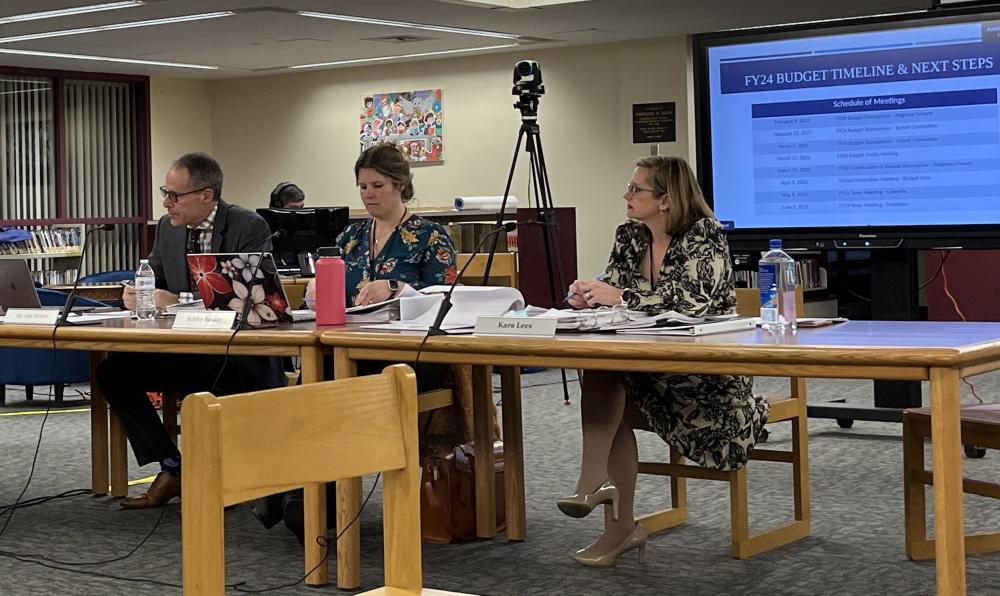Officials debate using excess funds to reduce Lakeville schools tax impact
LAKEVILLE — Due to cuts from the Freetown-Lakeville Regional School District’s original budget plan explained at the March 15 School Committee meeting, Lakeville’s proposed contribution to next year’s budget is currently projected to be a 3.02% increase over this year’s $43.3 million budget.
The original budget plan, presented on Feb. 15, projected a 5.14% increase in Lakeville’s share. A rise in state funding allocated to the district saw that number drop to 3.82% as of an update issued on March 1.
The total projected budget for next year is $45.2 million.
The latest cuts, detailed at the March 15 meeting, put the current estimated increase for Lakeville at 3.02%. The district has $2 million in excess funds available to spend, which Director of Finance Kara Lees said are best used to cover one-time expenses.
Among the items in the original budget that were cut from the latest update are a new George R. Austin Intermediate School special education teacher and two additional van drivers.
The district will hire a new special education team leader for the district and a new adjustment counselor for Austin Intermediate School.
The team leader will alleviate the special education workload on the staff and allow the district’s Director of Student Services Ashley Bouley to work on big-picture projects and let her accomplish her goal of being more visible within the district.
School administrators decided to add another counselor to the Austin Intermediate School staff during the Feb. 15 meeting. Superintendent Alan Strauss said the school has seen a “startling” increase in student visits to the counselor this year and last year.
In the Feb. 15 meeting, Austin Intermediate School Principal Elizabeth Sullivan said hiring a new counselor for the school is “not a wish or a hope, it’s a priority.”
Two new van drivers were cut from the budget because the school administration plans to reroute buses in order to make transportation more efficient.
The district has not rerouted its buses in six years, School Committee Chair Steve Owen said. He added that he would like to see more regular rerouting.
School Committee member Sherri Brown said that students should be on a bus for no longer than 15 minutes, and some routes are pushing that. Owen said that is tough for the district to adhere to because both towns cover large geographic areas.
Strauss said that the school can plan routes better—and form a more accurate budget—when students and families who decline to use buses submit written opt-outs to the district.
“Some of the high school buses have three kids on them,” Strauss said, likely because students stop riding the bus once they get their driver’s license.
In addition to trying to make the budget more efficient, town officials asked how the $2 million in excess funds can alleviate the budget’s burden on taxpayers.
Excess funds are best used for one-time payments because the district avoids surprising the towns with added costs, Lees said. If the district did use excess funds on annual expenses, things previously covered by excess funds would eventually be added back into the budget.
Lakeville Select Board member Richard LaCamera asked why replacing student laptops, which would add $300,000 to the budget, was not being paid for instead with excess funds.
School Committee Chair Steve Owen said it was a fair question and that the district would look into the idea.
LaCamera also raised concerns about how the towns will afford the three teachers whose salaries are currently covered by the state’s Elementary and Secondary School Emergency Relief Fund grant program. The funding expires after the 2024-25 school year.
Freetown Finance Committee member Margaret French said during the meeting that those salaries could cost $225,000.
Proceeds to the town from development projects in Lakeville have dropped from around $525,000 last year to $350,000 this year “if we’re lucky,” LaCamera said.
The decrease means taxpayers will have a larger portion of the budget to pay for, and he also said that 67% of the town’s tax dollars are projected to go to the school budget.
“There’s no way you’re going to sustain this budget,” LaCamera said.













